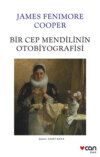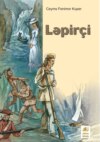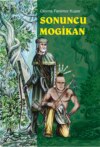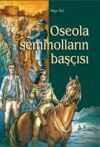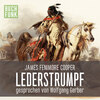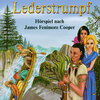Kitabı oku: «The Chainbearer: or, The Littlepage Manuscripts», sayfa 7
CHAPTER VII
"Who is that graceful female here
With yon red hunter of the deer?
Of gentle mien and shape, she seems
For civil halls design'd;
Yet with the stately savage walks,
As she were of his kind."
– Pinckney.
I made little stay in Albany, but, giving the direction to the patent to the axe-men, left it the very day of our arrival. There were very few public conveyances in that early day, and I was obliged to hire a wagon to transport Jaap and myself, with our effects, to Ravensnest. A sort of dull calm had come over the country, after the struggles of the late war; but one interest in it appearing to be alive and very active. That interest, fortunately for me, appeared to be the business of "land-hunting" and "settling." Of this I had sufficient proof in Albany itself; it being difficult to enter the principal street of that town, and not find in it more or less of those adventurers, the emblems of whose pursuit were the pack and the axe. Nine out of ten came from the Eastern or New England States; then the most peopled, while they were not very fortunate in either soil or climate.
We were two days in reaching Ravensnest, a property which I had owned for several years, but which I now saw for the first time. My grandfather had left a sort of agent on the spot, a person of the name of Jason Newcome, who was of my father the general's age, and who had once been a school-master in the neighborhood of Satanstoe. This agent had leased extensively himself, and was said to be the occupant of the only mills of any moment on the property. With him a correspondence had been maintained; and once or twice during the war my father had managed to have an interview with this representative of his and my interests. As for myself, I was now to see him for the first time. We knew each other by reputation only; and certain passages in the agency had induced me to give Mr. Newcome notice that it was my intention to make a change in the management of the property.
Any one who is familiar with the aspect of things in what is called a "new country" in America, must be well aware it is not very inviting. The lovers of the picturesque can have little satisfaction in looking even on the finest natural scenery at such moments; the labor that has been effected usually having done so much to mar the beauties of nature, without having yet had time to supply the deficiencies by those of art. Piles of charred or half-burned logs: fields covered with stumps, or ragged with stubs; fences of the rudest sorts, and filled with brambles; buildings of the meanest character; deserted clearings; and all the other signs of a state of things in which there is a manifest and constant struggle between immediate necessity and future expediency, are not calculated to satisfy either the hopes or the tastes. Occasionally a different state of things, however, under circumstances peculiarly favorable, does exist; and it may be well to allude to it, lest the reader form but a single picture of this transition state of American life. When the commerce of the country is active, and there is a demand for the products of new lands, a settlement often presents a scene of activity in which the elements of a thriving prosperity make themselves apparent amid the smoke of fallows, and the rudeness of border life. Neither, however, was the case at Ravensnest when I first visited the place; though the last was, to a certain extent, its condition two or three years later, or after the great European war brought its wheat and ashes into active demand.
I found but few more signs of cultivation, between the point where I left the great northern road and the bounds of the patent, than had been found by my father, as he had described them to me in his first visit, which took place a quarter of a century earlier than this of mine. There was one log tavern, it is true, in the space mentioned; but it afforded nothing to drink but rum, and nothing to eat but salted pork and potatoes, the day I stopped there to dine. But there were times and seasons when, by means of venison, wild-fowl and fish, a luxurious board might have been spread. That this was not the opinion of my landlady, nevertheless, was apparent from the remarks she made while I was at table.
"You are lucky, Major Littlepage," she said, "in not having come among us in one of what I call our 'starving times' – and awful times they be, if a body may say what she thinks on 'em."
"Starvation is a serious matter at any time," I answered, "though I did not know you were ever reduced to such difficulties in a country as rich and abundant as this."
"Of what use is riches and abundance if a man will do nothing but fish and shoot? I've seen the day when there wasn't a mouthful to eat in this house, but a dozen or two of squabs, a string of brook trout, and maybe a deer, or a salmon from one of the lakes."
"A little bread would have been a welcome addition to such a meal."
"Oh! as for bread, I count that for nothin'. We always have bread and potatoes enough; but I hold a family to be in a desperate way, when the mother can see the bottom of the pork barrel. Give me the children that's raised on good sound pork, afore all the game in the country. Game's good as a relish, and so's bread; but pork is the staff of life! To have good pork, a body must have good corn; and good corn needs hoeing; and a hoe isn't a fish-pole or a gun. No, my children I calkerlate to bring up on pork, with just as much bread and butter as they may want!"
This was American poverty as it existed in 1784. Bread, butter, and potatoes, ad libitum; but little pork, and no tea. Game in abundance in its season; but the poor man who lived on game was supposed to be keeping just as poor an establishment as the epicure in town who gives a dinner to his brethren, and is compelled to apologize for there being no game in the market. Curious to learn more from this woman, I pursued the discourse.
"There are countries, I have read," I continued, "in which the poor do not taste meat of any sort, not even game, from the beginning of the year to its end; and sometimes not even bread."
"Well, I'm no great hand for bread, as I said afore, and should eat no great matter of it, so long as I could get pork," the woman answered, evidently interested in what I had said; "but I shouldn't like to be without it altogether; and the children, especially, do love to have it with their butter. Living on potatoes alone must be a wild animal sort of a life."
"Very tame animals do it, and that from dire necessity."
"Is there any law ag'in their using bread and meat?"
"No other law than the one which forbids their using that which is the property of another."
"Good land!" This is a very common American expression among the women – "Good land! Why don't they go to work and get in crops, so they might live a little?"
"Simply because they have no land to till. The land belongs to others, too."
"I should think they might hire, if they couldn't buy. It's about as good to hire as it is to buy – some folks (folk) think it's better. Why don't they take land on shares, and live?"
"Because land itself is not to be had. With us, land is abundant; we have more of it than is necessary, or than will be necessary, for ages to come; perhaps it would be better for our civilization were there less of it, but, in the countries of which I speak, there are more people than there is land."
"Well, land is a good thing, I admit, and it's right there should be an owner to it; yet there are folks who would rather squat than buy or hire, any day. Squatting comes nat'ral to 'em."
"Are there many squatters in this part of the country?"
The woman looked a little confused, and she did not answer me, until she had taken time to reflect on what she should say.
"Some folks call us squatters, I s'pose," was the reluctant answer, "but I do not. We have bought the betterments of a man who hadn't much of a title, I think likely; but as we bought his betterments fairly, Mr. Tinkum" – that was the husband's name – "is of opinion that we live under title, as it is called. What do you say to it, Major Littlepage?"
"I can only say that naught will produce naught; nothing, nothing. If the man of whom you purchased owned nothing, he could sell nothing. The betterments he called his, were not his; and in purchasing them, you purchased what he did not own."
"Well, it's no great shakes, if he hadn't any right, sin' Tinkum only gi'n an old saddle, that warn't worth two dollars, and part of a set of single harness, that I'd defy a conjuror to make fit any mule, for the whull right. One year's rent of this house is worth all put together, and that twice over, if the truth must be said; and we've been in it, now seven years. My four youngest were all born under this blessed roof, such as it is!"
"In that case, you will not have much reason to complain, when the real owner of the soil appears to claim it. The betterments came cheap, and they will go as cheap."
"That's just it; though I don't call ourselves much of squatters, a'ter all, seein' we have paid suthin' for the betterments. They say an old nail, paid in due form, will make a sort of title in the highest court of the state. I'm sure the laws should be considerate of the poor."
"Not more so than of the rich. The laws should be equal and just; and the poor are the last people who ought to wish them otherwise, since they are certain to be the losers when any other principle governs. Rely on it, my good woman, the man who is forever preaching the rights of the poor is at bottom a rogue, and means to make that cry a stalking-horse for his own benefit; since nothing can serve the poor but severe justice. No class suffers so much by a departure from the rule, as the rich have a thousand other means of attaining their ends, when the way is left clear to them, by setting up any other master than the right."
"I don't know but it may be so; but I don't call ourselves squatters. There is dreadful squatters about here, though, and on your lands too, by the tell."
"On my lands? I am sorry to hear it, for I shall feel it a duty to get rid of them. I very well know that the great abundance of land that we have in the country, its little comparative value, and the distance at which the owners generally reside from their estates, have united to render the people careless of the rights of those who possess real property; and I am prepared to view things as they are among ourselves, rather than as they exist in older countries; but I shall not tolerate squatters."
"Well, by all I hear, I think you'll call old Andries, the Chainbearer, a squatter of the first class. They tell me the old chap has come back from the army as fierce as a catamount, and that there is no speaking to him, as one used to could, in old times."
"You are, then, an old acquaintance of the Chainbearer?"
"I should think I was! Tinkum and I have lived about, a good deal, in our day; and old Andries is a desp'ate hand for the woods. He surveyed out for us, once, or half-surveyed, another betterment; but he proved to be a spiteful rogue afore he got through with the business; and we have not set much store by him ever sin' that time."
"The Chainbearer a rogue! Andries Coejemans any thing but an honest man! You are the first person, Mrs. Tinkum, I have ever heard call in question his sterling integrity."
"Sterling money doesn't pass now, I conclude, sin' it's revolution times. We all know which side your family was on in the war, Major Littlepage; so it's no offence to you. A proper sharp lookout they had of it here, when you quit college; for some said old Herman Mordaunt had ordered in his will that you should uphold the king; and then, most of the tenants concluded they would get the lands altogether. It is a sweet thing, major, for a tenant to get his farm without paying for it, as you may judge! Some folks was desp'ate sorry when they heern tell that the Littlepages went with the colonies."
"I hope there are few such knaves on the Ravensnest estate as to wish anything of the sort. But, let me hear an explanation of your charge against the Chainbearer. I have no great concern for my own rights in the patent that I claim."
The woman had the audacity, or the frankness, to draw a long, regretful sigh, as it might be, in my very face. That sigh expressed her regrets that I had not taken part with the crown in the last struggle; in which case, I do suppose, she and Tinkum would have contrived to squat on one of the farms of Ravensnest. Having sighed, however, the landlady did not disdain to answer.
"As for the Chainbearer, the simple truth is this," she said. "Tinkum hired him to run a line between some betterments we had bought, and some that had been bought by a neighbor of our'n. This was long afore the war, and when titles were scarcer than they're gettin' to be now, some of the landlords living across the water. Well, what do you think the old fellow did, major? He first asked for our deeds, and we showed them to him; as good and lawful warrantees as was ever printed and filled up by a 'squire. He then set to work, all by himself, jobbing the whull survey, as it might be, and a prettier line was never run, as far as he went, which was about half-way. I thought it would make etarnel peace atween us and our neighbor, for it had been etarnel war afore that, for three whull years; sometimes with clubs, and sometimes with axes, and once with scythes. But, somehow – I never know'd how– but somehow, old Andries found out that the man who deeded to us had no deed to himself, or no mortal right to the land, any more than that sucking pig you see at the door there; when he gi'n right up, refusing to carry out another link, or p'int another needle, he did! Warn't that being cross-grained and wilful! No, there's no dependence to be put on the Chainbearer."
"Wilful in the cause of right, as glorious old Andries always is! I love and honor him all the better for it."
"La! Do you love and honor sich a one as him! Well, I should have expected suthin' else from sich a gentleman as you! I'd no idee Major Littlepage could honor an old, worn-out chainbearer, and he a man that couldn't get up in the world, too, when he had hands and feet, all on 'em together on some of the very best rounds of the ladder! Why, I judge that even Tinkum would have gone ahead, if he had been born with sich a chance."
"Andries has been a captain in my own regiment, it is true, and was once my superior officer; but he served for his country's sake, and not for his own. Have you seen him lately?"
"That we have! He passed here about a twelvemonth ago, with his whull party, on their way to squat on your own land, or I'm mistaken. There was the Chainbearer himself, two helpers, Dus and young Malbone."
"Young who?" I asked, with an interest that induced the woman to turn her keen, sunken, but sharp gray eyes, intently on me.
"Young Malbone, I said; Dus's brother, and the youngster who does all old Andries's 'rithmetic. I suppose you know as well as I do, that the Chainbearer can't calkerlate any more than a wild goose, and not half as well as a crow. For that matter, I've known crows that, in plantin' time, would measure a field in half the number of minutes that the state surveyor would be hours at it."
"This young Malbone, then, is the Chainbearer's nephew? And he it is who does the surveying?"
"He does the 'rithmetic part, and he is a brother of old Andries's niece. I know'd the Coejemans when I was a gal, and I've known the Malbones longer than I want to know them."
"Have you any fault to find with the family, that you speak thus of them?"
"Nothin' but their desperate pride, which makes them think themselves so much better than everybody else; yet, they tell me, Dus and all on 'em are just as poor as I am myself."
"Perhaps you mistake their feeling, good woman; a thing I think the more probable, as you seem to fancy money the source of their pride, at the very moment you deny their having any. Money is a thing on which few persons of cultivated minds pride themselves. The purse-proud are, almost invariably, the vulgar and ignorant."
No doubt this was a moral thrown away with such an auditor; but I was provoked; and when a man is provoked, he is not always wise. The answer showed the effect it had produced.
"I don't pretend to know how that is; but if it isn't pride, what is it that makes Dus Malbone so different from my da'ters? She'd no more think of being like one on 'em, scouring about the lots, riding bare-backed, and scampering through the neighborhood, than you'd think of cooking my dinner – that she wouldn't."
Poor Mrs. Tinkum – or, as she would have been apt to call herself, Miss Tinkum! She had betrayed one of the commonest weaknesses of human nature, in thus imputing pride to the Chainbearer's niece because the latter behaved differently from her and hers. How many persons in this good republic of ours judge their neighbors on precisely the same principle; inferring something unsuitable, because it seems to reflect on their own behavior! But by this time, I had got to hear the name of Dus with some interest, and I felt disposed to push the subject further.
"Miss Malbone, then," I said, "does not ride bare-back?"
"La! major, what in natur' puts it into your head to call the gal Miss Malbone! There's no Miss Malbone living sin' her own mother died."
"Well, Dus Malbone, I mean; she is above riding bare-backed?"
"That she is; even a pillion would be hardly grand enough for her, allowing her own brother to use the saddle."
"Her own brother! This young surveyor, then, is Dus's brother?"
"Sort o', and sort o' not, like. They had the same father, but different mothers."
"That explains it; I never heard the Chainbearer speak of any nephew, and it seems the young man is not related to him at all – he is the half-brother of his niece."
"Why can't that niece behave like other young women? that's the question I ask. My girls hasn't as much pride as would be good for 'em, not they! If a body wants to borrow an article over at the Nest, and that's seven miles off, the whull way in the woods, just name it to Poll, and she'd jump on an ox, if there warn't a hoss, and away she'd go a'ter it, with no more bit of a saddle, and may be nothin' but a halter, like a deer! Give me Poll, afore all the gals I know, for ar'nds?"
By this time, disrelish for vulgarity was getting the better of curiosity; and my dinner of fried pork being done, I was willing to drop the discourse. I had learned enough of Andries and his party to satisfy my curiosity, and Jaap was patiently waiting to succeed me at the table. Throwing down the amount of the bill, I took a fowling-piece, with which we always travelled in those days, bade Mrs. Tinkum good-day, ordered the black and the wagoner to follow with the team as soon as ready, and went on toward my own property on foot.
In a very few minutes I was quite beyond the Tinkum betterments, and fairly in the forest again. It happened that the title to a large tract of land adjoining Ravensnest was in dispute, and no attempt at a serious settlement had ever been made on it. Some one had "squatted" at this spot, to enjoy the advantage of selling rum to those who went and came between my own people and the inner country; and the place had changed hands half a dozen times, by fraudulent, or at least, by worthless sales, from one squatter to another. Around the house, by this time a decaying pile of logs, time had done a part of the work of the settler, and aided by that powerful servant but fearful master, fire, had given to the small clearing somewhat of the air of civilized cultivation. The moment these narrow limits were passed, however, the traveller entered the virgin forest, with no other sign of man around him than what was offered in the little worked and little travelled road. The highway was not much indebted to the labors of man for any facilities it afforded the traveller. The trees had been cut out of it, it is true, but their roots had not been extracted, and time had done more toward destroying them than the axe or the pick. Time had done a good deal, however, and the inequalities were getting to be smooth under the hoof and wheel. A tolerably good bridle-path had long been made, and I found no difficulty in walking in it, since that answered equally well for man and beast.
The virgin forest of America is usually no place for the ordinary sportsman. The birds that are called game are but rarely found in it, one or two excepted; and it is a well-known fact that while the frontier-man is certain death with a rifle-bullet, knocking the head off a squirrel or a wild turkey at his sixty or eighty yards, it is necessary to go into the older parts of the country, and principally among sportsmen of the better classes, in order to find those who knock over the woodcock, snipe, quail, grouse, and plover, on the wing. I was thought a good shot on the "plains," and over the heaths or commons of the Island of Manhattan, and among the rocks of Westchester; but I saw nothing to do up there, where I then was, surrounded by trees that had stood there centuries. It would certainly have been easy enough for me to kill a blue jay now and then, or a crow, or even a raven, or perhaps an eagle, had I the proper shot; but as for anything that is ordinarily thought to adorn a game-bag, not a feather could I see. For the want of something better to do, then, if a young man of three or four and twenty ought thus to express himself, I began to ruminate on the charms of Pris Bayard, and on the singularities of Dus Malbone. In this mood I proceeded, getting over the grounds at a rapid rate, leaving Miss Tinkum, the clearing with its betterments, and the wagon, far behind me.
I had walked an hour alone, when the silence of the woods was suddenly interrupted by the words of a song that came not from any of the feathered race, though the nightingale itself could hardly have equalled the sweetness of the notes, which were those of a female voice. The low notes struck me as the fullest, richest, and most plaintive I had ever heard; and I fancied they could not be equalled, until the strain carried the singer's voice into a higher key, where it seemed equally at home. I thought I knew the air, but the words were guttural, and in an unknown tongue. French and Dutch were the only two foreign languages in which one usually heard any music in our part of the woods at that day; and even the first was by no means common. But with both these languages I had a little acquaintance, and I was soon satisfied that the words I heard belonged to neither. At length it flashed on my mind that the song was Indian; not the music, but the words. The music was certainly Scotch, or that altered Italian that time has attributed to the Scotch; and there was a moment when I fancied some Highland girl was singing near me one of the Celtic songs of the country of her childhood. But closer attention satisfied me that the words were really Indian; probably belonging to the Mohawk, or some other language that I had often heard spoken.
The reader may be curious to know whence these sounds proceeded, and why I did not see the being who gave birth to such delicious harmony. It was owing to the fact that the song came from out of a thicket of young pines, that grew on an ancient opening at a little distance from the road, and which I supposed contained a hut of some sort or other. These pines, however, completely concealed all within them. So long as the song lasted, no tree of the forest was more stationary than myself; but when it ended, I was about to advance toward the thicket, in order to pry into its mysteries, when I heard a laugh that had scarcely less of melody in it than the strains of the music itself. It was not a vulgar, clamorous burst of girlish impulses, nor was it even loud; but it was light-hearted, mirthful, indicating humor, if a mere laugh can do so much; and in a sense it was contagious. It arrested my movement, in order to listen; and before any new impulse led me forward, the branches of the pines opened, and a man passed out of the thicket into the road. A single glance sufficed to let me know that the stranger was an Indian.
Notwithstanding I was apprised of the near vicinity of others, I was a little startled with this sudden apparition. Not so with him who was approaching; he could not have known of my being anywhere near him; yet he manifested no emotion as his cold, undisturbed glance fell on my form. Steadily advancing, he came to the centre of the road; and, as I had turned involuntarily to pursue my own way, not sure it was prudent to remain in that neighborhood alone, the red man fell in, with his moccasined foot, at my elbow, and I found that we were thus strangely pursuing our journey, in the same direction, side by side.
The Indian and myself walked in this manner, within a yard of each other, in the midst of that forest, for two or three minutes without speaking. I forbore to say anything, because I had heard that an Indian respected those most who knew best how to repress their curiosity; which habit, most probably, had its effect on my companion. At length, the red man uttered, in the deep, guttural manner of his people, the common conventional salutation of the frontier —
"Sa-a-go?"
This word, which has belonged to some Indian language once, passes everywhere for Indian with the white man; and, quite likely for English, with the Indian. A set of such terms has grown up between the two races, including such words as "moccasin," "pappoose," "tomahawk," "squaw," and many others. "Sa-a-go," means "how d'ye do?"
"Sa-a-go?" – I answered to my neighbor's civil salutation.
After this we walked along for a few minutes more, neither party speaking. I took this opportunity to examine my red brother, an employment that was all the easier from the circumstance that he did not once look at me; the single glance sufficing to tell him all he wanted to know. In the first place, I was soon satisfied that my companion did not drink, a rare merit in a red man who lived near the whites. This was evident from his countenance, gait, and general bearing, as I thought, in addition to the fact that he possessed no bottle, or anything else that would hold liquor. What I liked the least was the circumstance of his being completely armed; carrying knife, tomahawk, and rifle, and each seemingly excellent of its kind. He was not painted, however, and he wore an ordinary calico shirt, as was then the usual garb of his people in the warm season. The countenance had the stern severity that is so common to a red warrior; and, as this man was turned of fifty, his features began to show the usual signs of exposure and service. Still, he was a vigorous, respectable-looking red man, and one who was evidently accustomed to live much among civilized men. I had no serious uneasiness, of course, at meeting such a person, although we were so completely buried in the forest but, as a soldier, I could not help reflecting how inferior my fowling-piece would necessarily prove to be to his rifle should he see fit to turn aside, and pull upon me from behind a tree, for the sake of plunder. Tradition said such things had happened; though, on the whole, the red man of America has perhaps proved to be the most honest of the two, as compared with those who have supplanted him.
"How ole chief?" the Indian suddenly asked, without even raising his eyes from the road.
"Old chief! Do you mean Washington, my friend?"
"Not so – mean ole chief, out here, at Nest. Mean fader."
"My father! Do you know General Littlepage?"
"Be sure, know him. Your fader – see" – holding up his two forefingers – "just like – dat him; dis you."
"This is singular enough! And were you told that I was coming to this place?"
"Hear dat, too. Always talk about chief."
"Is it long since you saw my father?"
"See him in war-time – nebber hear of ole Sureflint?"
I had heard the officers of our regiment speak of such an Indian, who had served a good deal with the corps, and been exceedingly useful, in the two great northern campaigns especially. He never happened to be with the regiment after I joined it, though his name and services were a good deal mixed up with the adventures of 1776 and 1777.
"Certainly," I answered, shaking the red man cordially by the hand. "Certainly, have I heard of you, and something that is connected with times before the war. Did you never meet my father before the war?"
"Sartain; meet in ole war. Gin'ral young man, den – just like son."
"By what name were you then known, Oneida?"
"No Oneida – Onondago – sober tribe. Hab plenty name. Sometime one, sometime anoder. Pale-face say 'Trackless,' cause he can't find his trail – warrior call him 'Susquesus.'"











